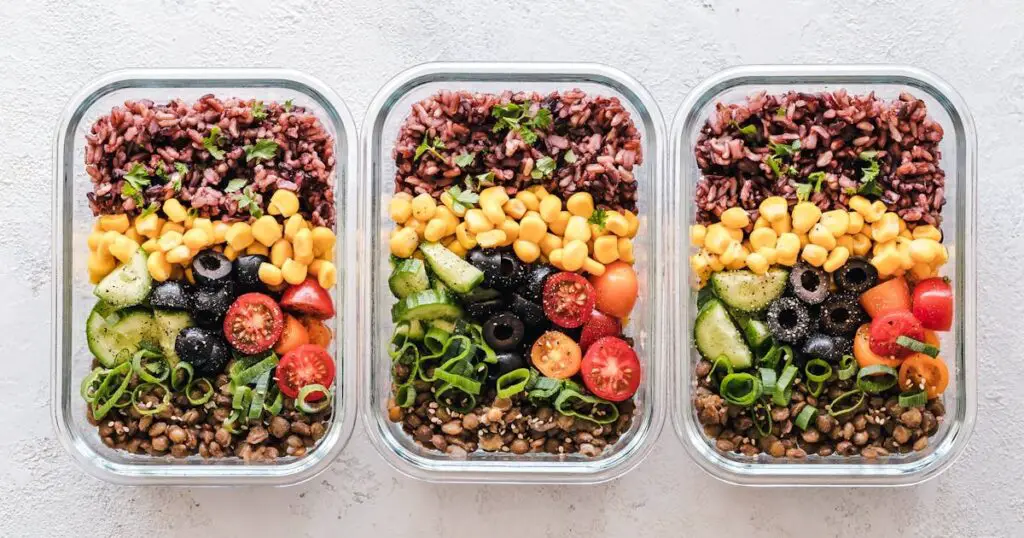Key Takeaway: Meal prepping can limit variety, leading to nutritional imbalances and boredom with repetitive meals. Over time, this monotony might discourage healthy eating habits and cause reliance on the same ingredients, potentially missing out on essential nutrients.

Meal prep has become extremely popular in recent years, with many people praising its time-saving and health benefits. However, there are also some downsides to this practice that often go unnoticed.
In this article, we will explore the reasons why meal prep may not be as beneficial as it seems and why you should think twice before jumping on the bandwagon.
Worst Types of Food to Meal Prep
One of the biggest issues with meal prep is that it can lead to unhealthy food choices. Many people choose convenience over nutrition when prepping their meals, resulting in a diet high in processed foods, sodium, and added sugars. These types of foods are known to increase the risk of chronic diseases such as obesity, diabetes, and heart disease.
Furthermore, some foods do not hold up well when prepared in advance. For example, salads can become soggy and lose their nutritional value if stored for too long. Foods that are reheated multiple times can also lose essential nutrients, making them less beneficial for your health.
Is it OK to Eat the Same Meals Each Day?
Another downside of meal prep is the monotony it can create in your diet. While it may be convenient to eat the same meals every day, it can lead to boredom and even nutrient deficiencies over time. Our bodies require a variety of nutrients from different food sources to function properly. Eating the same meals repeatedly limits our options and may result in a lack of essential vitamins and minerals.
Moreover, restricting yourself to a specific set of meals can also lead to unhealthy eating habits. It may make you feel deprived, leading to bingeing or overeating unhealthy foods when the monotony becomes too much to handle. This can have negative effects on your physical and mental health in the long run.
Health Concerns to Consider
While meal prep may seem like a healthy option for many people, it is not suitable for everyone. Individuals with certain health conditions such as diabetes or kidney disease may need to follow a specific diet plan tailored to their needs. Meal prep can make it challenging to meet these requirements, leading to potential health risks.
Additionally, meal prep does not take into account individual differences in dietary needs and preferences. It may not be suitable for people with food allergies or intolerances, as cross-contamination can occur when prepping multiple meals at once.
The Danger of Meal-Prepping the Wrong Way
Meal prep can also have a negative impact on our environment if not done correctly. Many people use single-use plastic containers and bags to store their prepped meals, contributing to the growing issue of plastic pollution. Moreover, meal prep often involves cooking in bulk, resulting in more energy consumption and waste production.

Incorporating meal prep into your routine without considering these factors can do more harm than good to both your health and the environment.
FAQs: Why Meal Prep is Bad
Is it necessary to follow a specific diet plan while meal-prepping?
It depends on your health conditions and dietary needs. It is best to consult with a healthcare professional or registered dietitian before starting meal prep.
Can meal prep lead to weight gain?
Meal prep itself does not cause weight gain, but the types of foods you choose to include in your meals can play a significant role in your weight management. Be mindful of your food choices and make sure to incorporate a variety of whole, nutritious foods into your prepped meals.
How often should I meal prep?
It varies from person to person, but it is recommended to limit meal prepping to once or twice a week to avoid potential nutrient deficiencies from eating the same meals repeatedly.
Are there any alternatives to using plastic containers for meal prep?
Yes, you can opt for reusable glass or stainless steel containers instead. These are more eco-friendly options and can also be used in the microwave or oven.
Conclusion
While meal prep may seem like a convenient and healthy choice at first glance, it is essential to consider its potential downsides before incorporating it into your lifestyle. From unhealthy food choices and monotony in diet to health concerns and environmental impacts, meal prep may not be as beneficial as it appears to be.
Ultimately, moderation and mindful decision-making are key when it comes to any dietary practice. Consider consulting with a healthcare professional or registered dietitian before making significant changes to your eating habits.



Leave a Comment
You must be logged in to post a comment.